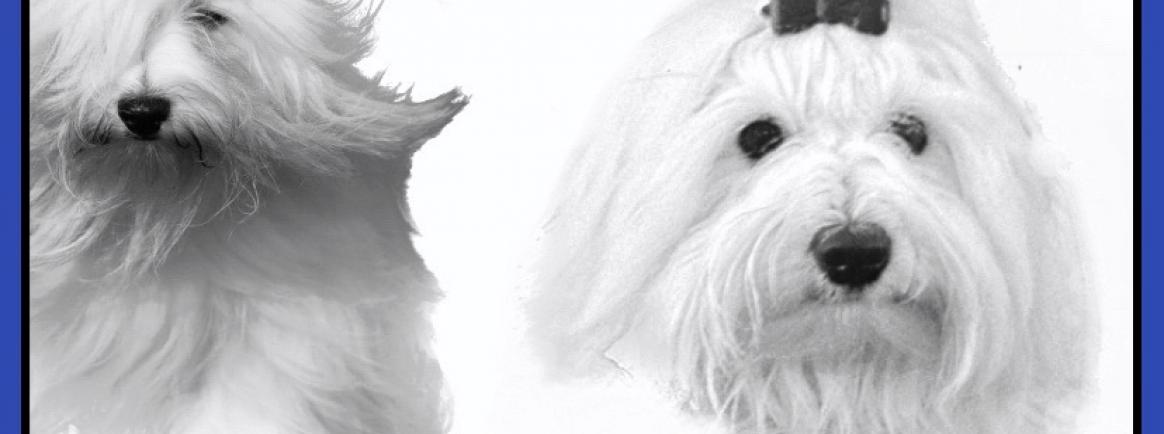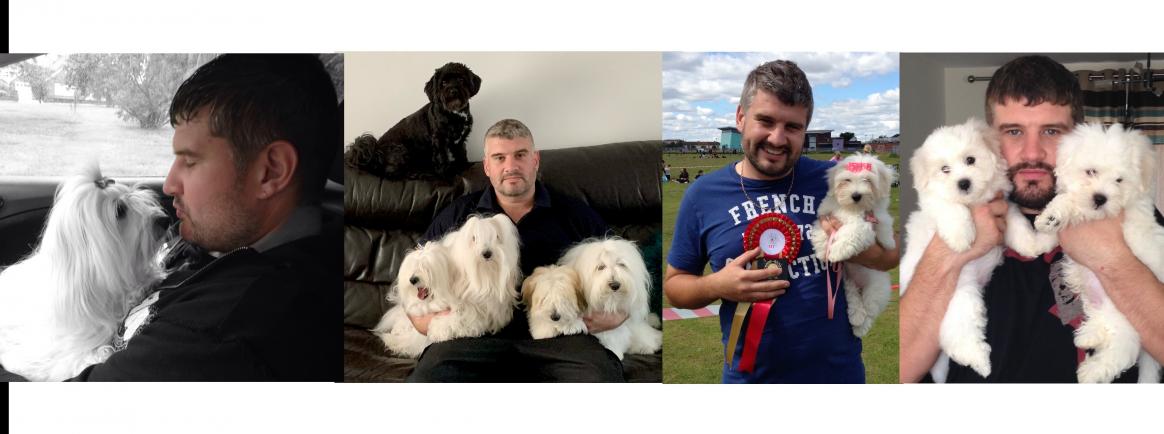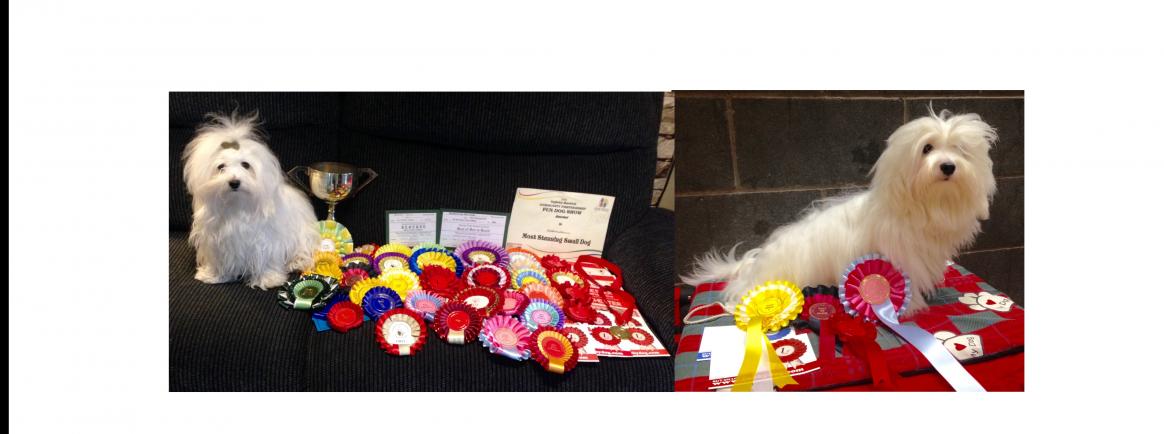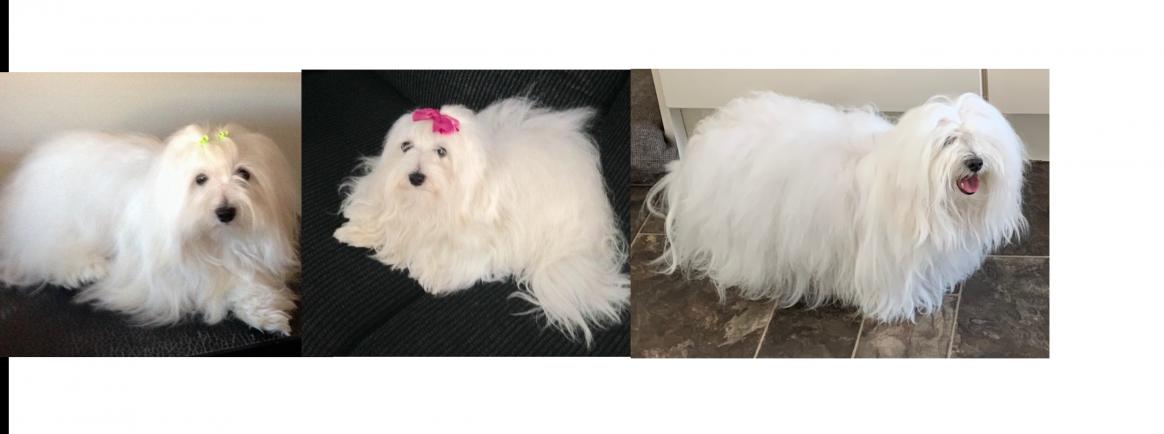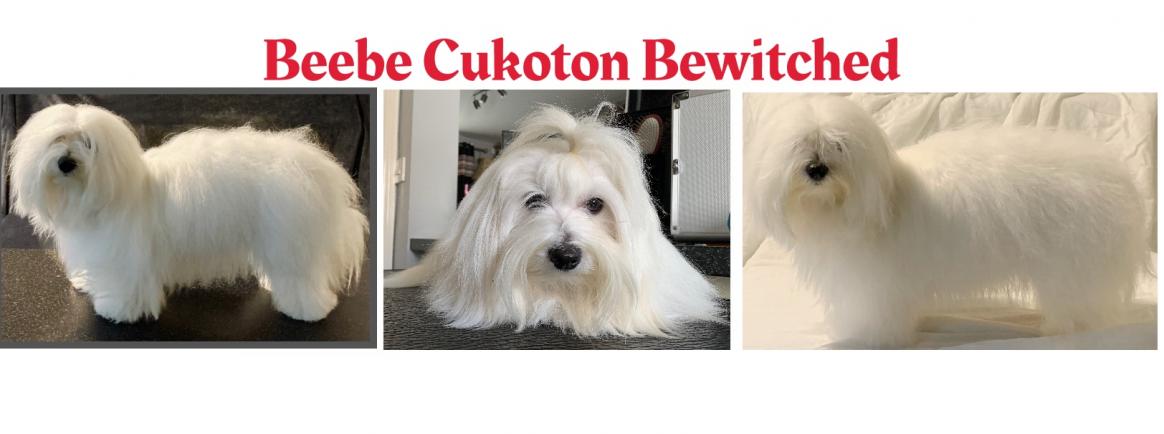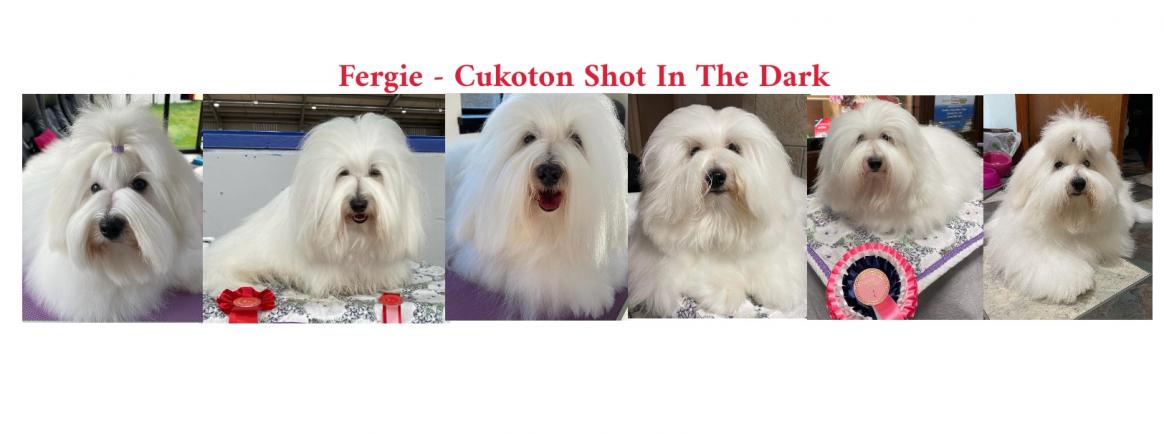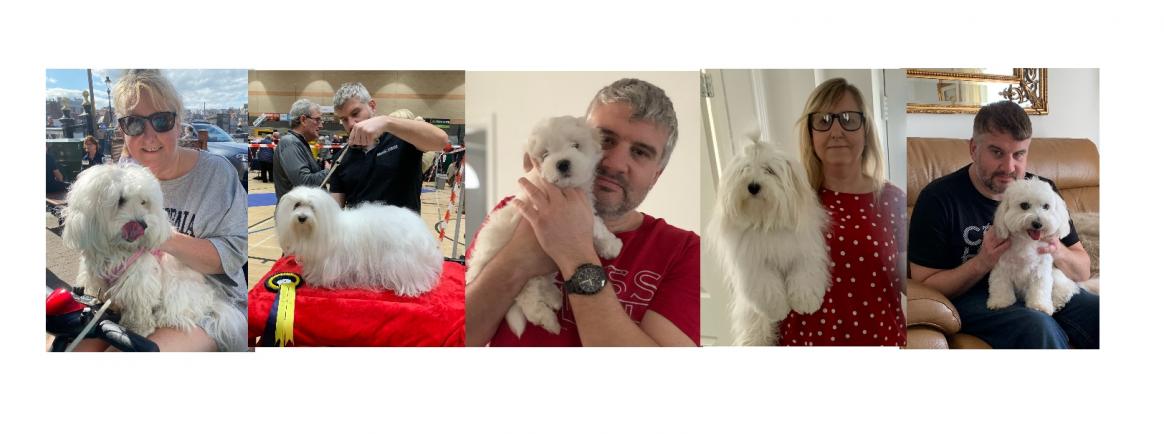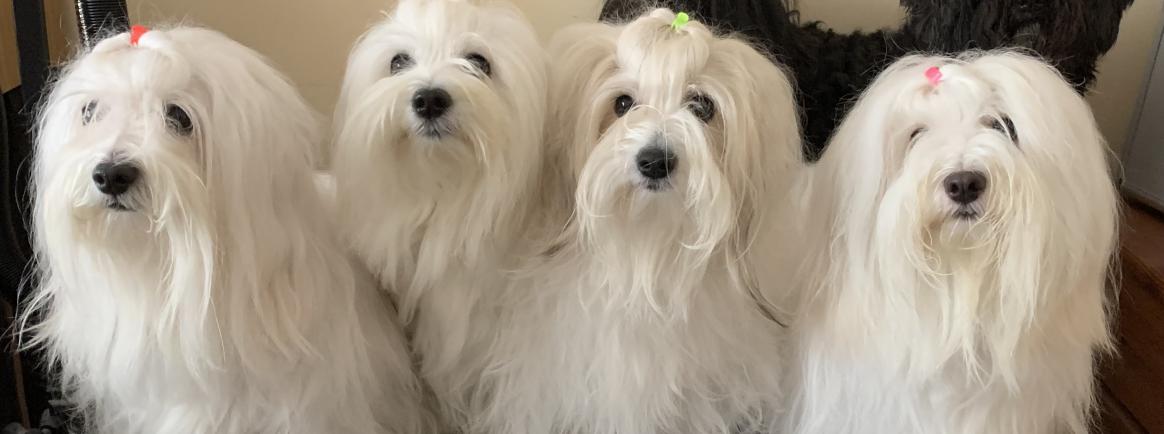Health problems in elderly Cotons
Arthritis
The most common form of arthritis seen in elderly dogs is Osteoarthritis, also called Degenerative Joint Disease. As dogs age, cartilage between their joints can become inflamed or damaged. This causes swelling, pain, stiffness. slower movements, stiffness in getting up, limping, reluctance to jump, a lack of interest in walking and playing
Of course, elderly dogs aren't GUARANTEED to develop any of the conditions above, they're just put at a higher risk because of their age.
Supplements can be used to help your Cotons joints such as omega 6, primrose oil capsules, cod liver oil and all in one supplements.
Cancer
Cancer. Older dogs are prone to getting lumps and bumps, and luckily, not all of them are cancerous. Age does increases the risk of cancer.
Though younger pets can get cancer, it is seen much more frequently in older pets.
Different cancers cause different symptoms, so they can be easy to dismiss.
Cancer is responsible for close to half of the deaths of pets over the age of ten according to the Veterinary Journal research. Other disorders include Thyroid disease; Liver disease; Prostate problems; High blood pressure (hypertension); Gastrointestinal issues ·
Kidney disease
The chronic kidney (renal) disease is usually a gradual process that begins as renal insufficiency and progresses to full renal failure
Urinary incontinence, is also a symptom of kidney disease. Your dog might also show significantly increased thirst, decreased appetite, lethargy,
Kidney disease occurs when the kidneys no longer function correctly, and are unable to remove toxins from your dog's body.
Kidney disease is one of the most common metabolic diseases of older dogs. With early diagnosis through blood tests, some dogs can do quite well on a specialised treatments.
Kidney disease can be caused by many things, including other diseases (such as diabetes), medications, kidney stones, or problems with the bladder.
Heart problems
Heart disease can also develop as dogs age. One condition in dogs is congestive heart failure, which occurs when the heart isn't able to pump blood around the body adequately. The most common heart disease in the senior dog is chronic valvular heart disease. Thickening and irregularities of any of the valves of the heart.
Dog dementia (Cognitive Dysfunction Syndrome) may also be linked to heart disease
Diabetes
While diabetes is often hereditary, it tends to begin when dogs are between eight and nine years old.
Ageing dogs tend to have a higher risk of developing diabetes. Whether due to diet, poor insulin secretion or resistance to insulin. The symptoms to look out for are: Drinking lots of water; urinating a lot; Dull, poor hair coat; Listlessness; Increased appetite; Vomiting; Weight loss despite a large appetite. Chronic reoccurring infections & Cloudy eyes
In order to try to prevent your elderly dog of developing diabetes, Keep your dog lean and active
Urinary incontinence
Incontinence can be a sign of many different diseases, so it is essential to have your vet rule out other health problems
Urinary incontinence, is also a symptom of kidney disease. Your dog might also show significantly increased thirst, decreased appetite, lethargy,
Urinary tract issues can vary from painful infections to incontinence, which can be upsetting to pets that are normally housebroken. Older pets often lose the ability to control their bladders or bowels which results in accidents around the house. Seek veterinary help when you start noticing your dog is having more indoor accidents. Doggie diapers or a permanent toilet near the door can help.
Obesity
Your dog's weight can have a significant impact on their health at any age. An owner sometimes over feeds as an expression of their love.
Older dogs carrying excess weight can cause or complicate health problems like arthritis, heart disease, and diabetes. To prevent obesity in older dogs, decrease food amount as the dogs exercise and activity decreases.
Vision & Hearing loss
Many older dogs experience a gradual loss of vision. This is usually due to degenerative changes in the eye but can be caused by an eye disease.
Age-related cloudiness of your dog's eye lenses is called lenticular sclerosis and usually appears when dogs are between six and eight years old. This condition is not painful and only causes minor vision loss. Cataracts are common in dogs with diabetes, & can cause cloudiness in the eye and partial or total blindness. Depending on the severity of the blindness, cataract surgery may restore some or all of his vision. If surgery is not an option, dogs are highly adaptable to vision loss. You can help your vision-impaired dog in the home by always keeping furniture in the same location.
Deafness, If you notice your dog having any problems with getting around or they don't respond to calls deafness maybe the cause
If deafness is unavoidable, there are some things you can do to make your senior dog more confident, hand signals are a great way of communicating with your dog.
Sensory Changes
Many elderly dogs experience decreases in their senses. The ability to see, hear, taste, and smell can be affected. Partial or complete loss of hearing and vision can decrease your dog’s ability to sense their environment. Due to this your dog may not sense your approach and startle more easily. This can become troublesome around small children. To avoid scaring your dog, try to announce your presence with a loud greeting and approaching from within your dog’s line of vision.
As dogs age, the number of taste buds they have decreases. That decrease coupled with a decreased ability to smell, may affect your dog’s desire to eat. Food becomes less tasty. Consult with your vet if you notice problems with appetite.
While sensory losses are a natural part of the aging process for many dogs, this may not be the case for every dog. There are several medical conditions and illnesses that cause visual, auditory and other sensory impairments in dogs. It’s important to have your veterinarian examine your dog to determine whether their changes are part of the aging process or whether there is an underlying disease or condition.
Dementia
Dementia/Cognitive Dysfunction. Like people, dogs can lose cognitive function as they age, they experience brain changes, resulting in symptoms similar to those of senility or Alzheimer's. Canine dementia causes confusion, disorientation, restlessness.
Fortunately, there are medications that may be able to reduce your dog's dementiasymptoms.
Sometimes your once independent dog develops separation anxiety, which can be brought on by cognitive decline. Anxiety in elderly dogs is rather common and can
Behavioral Changes
Approximately 50% of dogs greater than 10 years of age show behavior changes.
It’s common for an older dog to slow down and sleep more. It’s a mistake, however, to assume all changes in your dog are a natural part of the aging process. Behavior changes such as difficulty getting up or stiffness, anxiety, aggression and other abnormalities can mean something is wrong. There are many health issues that cause pain and discomfort in your dog which lead to their reluctance to move or increased irritability. It’s important to bring up behavior changes with your veterinarian as some conditions are treatable to maintain a good quality of life for you Coton.
Hypothyroidism (abnormally low levels of thyroid hormones)
Your dog will exhibit weight gain, (without appetite increase); High blood cholesterol; Lethargy and mental dullness; Intolerance of exercise; Intolerance of cold fur loss, frequent ear infections, dull coat, thickened skin,
Liver diseases
Liver diseases are one of the most serious conditions that can afflict older Cotons. When liver disease begins the liver swells and enlarges. As the disease progresses, the liver cells die and are replaced by scar tissue. The liver becomes rubbery and firm, called cirrhosis and is not reversible. Before the liver reaches this terminal stage, the liver can with the correct treatment repair itself.
Common types of liver disease include:
Liver cancer or tumorous growths on the liver.
Cirrhosis.
Canine Hepatitis.
The Coton has a large liver for a small breed. A number of Cotons have a low to normal ALT Alanine Aminotransferease reading. Low levels are generally considered good and are usually not a cause for concern. However, as the Coton gets older 10 years plus these low ALT can cause such conditions as vitamin B6 deficiency or chronic kidney disease.
Symptoms include
Lethargy and fatigue
Low appetite
Weight loss
Drinking less or more than usual
Vomiting or diarrhoea
Shaking caused by nausea or discomfort
Other signs may include:
Digestive disorders such as constipation, gas and bloating
Dry, brittle or infected nails
Dull eyes, corneal or retinal disorder
Jaundice
Sinus issues
Dark urine
Ligament or tendon issues
Irritability and aggression
Seizures or fits
High temperature
A painful, bloated belly
Spontaneous bleeding
Pressing their head against things
Ascites
Hepatic encephalopathy (nervous system disorder)
Oedema-swollen lower limbs
Prostate Problems
Enlarged prostate can effect elderly dogs. Some dogs with prostrate problems experience changes in urination such as increased frequency, straining, interrupted streams of urine or blood, and constipation or straining to defecate.
High blood pressure (hypertension)
high blood pressure, is common in elderly dogs. It can have many causes, but can be successfully managed with medication. High blood pressure in dogs can be a sign of other problems including heart disease, stroke, and damage to the kidneys or retina.
Thyroid Disease (Hyperthyroidism)
Hyperthyroidism occurs when your dog's body produces too much of the thyroid hormone, it increases the dogs metabolic rate to dangerous levels. Although rare it can affect elderly Cotons If treated early the prognosis is good.
Symptoms include weight loss, increased appetite, excitability, increase in thirst and urination, vomiting, diarrhea, and increased heart rate
Gastrointestinal Issues
Gastrointestinal issues refer to disorders of the stomach (gastro-) or intestines, or other digestive problems.
Causes can also be related to Food intolerance. Infection (bacterial, viral, fungal) or Parasites.
Symptoms include
Excessive drooling,
Vomiting.
Bloating
Straining to defecate
Shock & shaking
regurgitation
Bleeding
Diarrhoea, with or without blood or mucus.
Constipation.
Increased gas or flatulence.
Loss of appetite.
Weight loss.
Fever.
Dehydration.
Abdominal pain (hunched posture)
Abdominal enlargement/distension.
Distress or inability to get comfortable.
If you elderly Coton experiences any of the symptoms listed above it is important to seek veterinary help immediately

